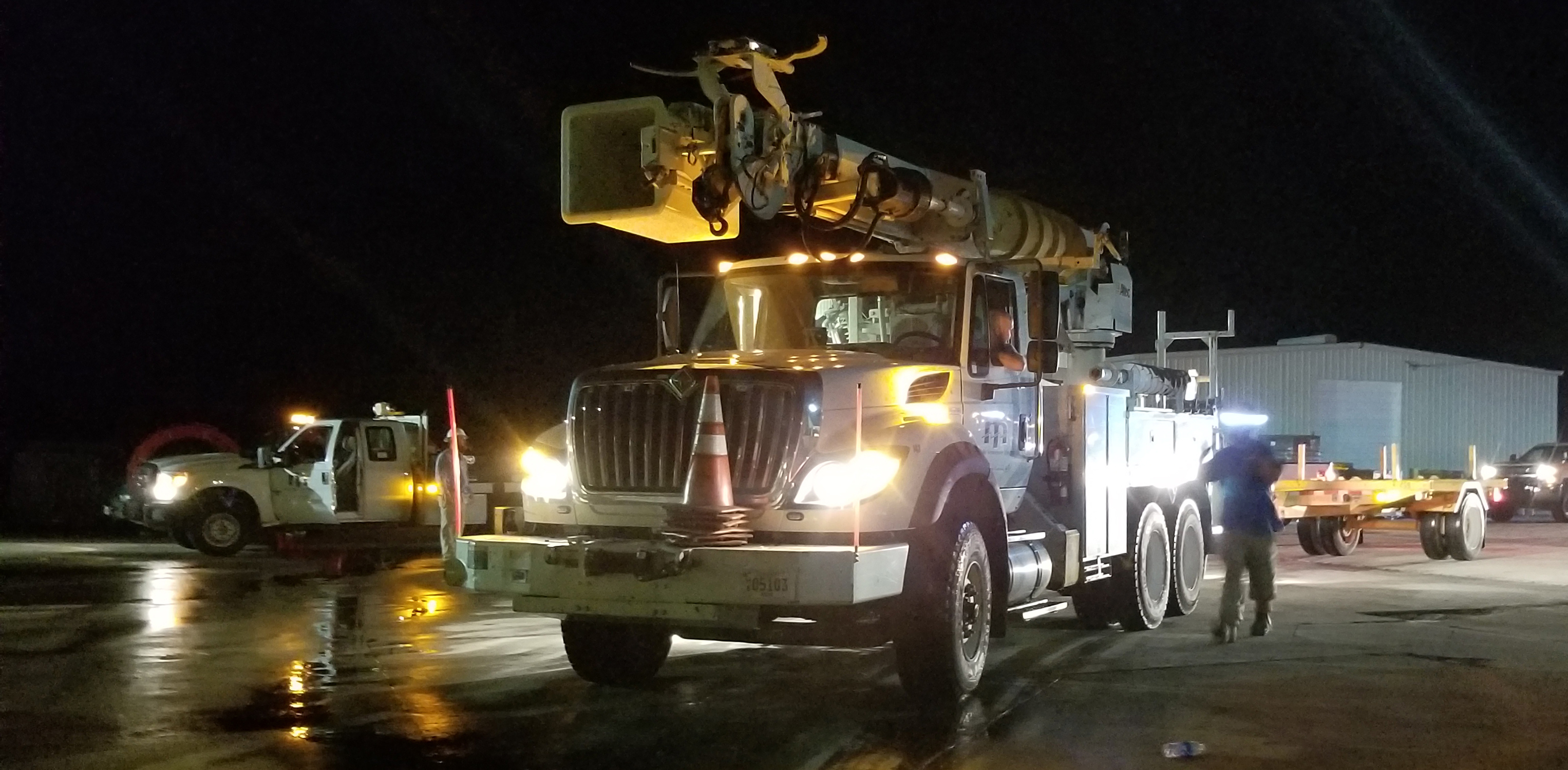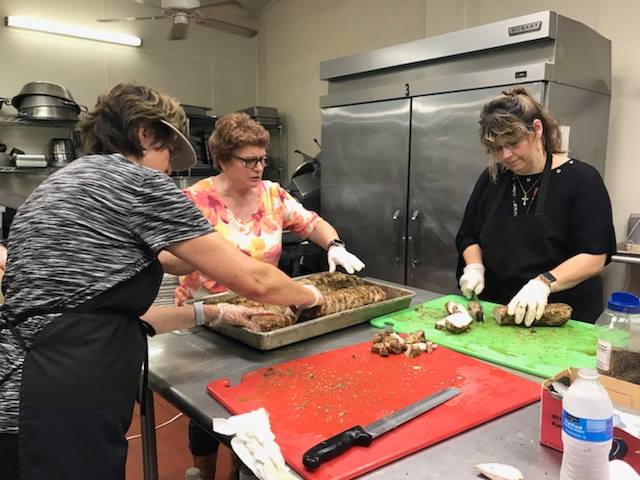Electric co-ops worked around the clock to get their communities back online.

Photo by Lisa Galizia.
By Gordon Byrd
“In the Face of Florence” first appeared in Carolina Country.
Florence made landfall near Wrightsville Beach on Friday, Sept. 14, as a massive and deadly storm. Electric co-ops serving southeastern counties— in particular Brunswick Electric, Carteret-Craven Electric Cooperative, Four County EMC (Electric Membership Corporation), Jones-Onslow EMC, Lumbee River EMC, South River EMC, Tideland EMC and Tri-County EMC— bore the brunt of the initial impact. But the storm’s trajectory would affect thousands farther inland in the coming days, causing flooding across much of the state. Peak electric co-op outages hit a record high of more than 300,000 — nearly one-third of all co-op members in North Carolina.
But at the co-ops faced with Florence’s force, a steeled determination met the furious winds.
“We knew we needed to have the strongest response possible,” said Don Hughes, CEO and general manager of Brunswick Electric. “We were ready.”

Daniel Hood, first-class lineman for Tri-County EMC, patrolled lines during Hurricane Florence restoration. Photo courtesy of Tri-County EMC.
At Lumbee River EMC, employees like contract services coordinator Derek Owens made arrangements weeks in advance for the crews coming in from other electric co-ops.
“We brought in co-op crews from Ohio, Tennessee and Alabama, besides the North Carolina trucks,” Owens said. Other affected co-ops also received assistance from Illinois, Florida and Georgia co-ops, as well as help from North Carolina co-ops unaffected by the storm.
Owens arrived before dawn the day before Florence made landfall with enough clothing for the week. While his contractors had hotel rooms, Owens slept on a cot next to his desk. Before the storm hit, finding accommodations was difficult, but the real challenge began after the storm.
Dry Socks and Bird-Dogging
As Florence churned down the coast into South Carolina, storm surge, winds and flooding proved devastating. Carteret-Craven Electric Cooperative lost power across its entire system. Brunswick Electric outages neared 100 percent. Such dire circumstances called for all hands on deck.
“People who do certain jobs under normal circumstances get assigned much different roles during emergencies like this because they are essential,” said Carteret-Craven Electric Cooperative communications director Lisa Galizia. “At times like this, what matters is lodging visiting crews, keeping everyone fed, getting supplies out and ‘bird-dogging’ for line crews unfamiliar with your territory. We’re constantly keeping track of where the crews are and how many meals they need so we can run them out to them.”
To keep the hundreds of line crew workers operational, it took a Herculean effort to keep them fed and well-equipped, including washing layers of required clothing.
“Nothing can keep these guys from doing the job they’re trained to do, but clean, dry socks do help,” said Brunswick Electric manager of operations Josh Winslow.
Brunswick Electric employees rose to the occasion to ferry more than 450 pounds of wet, soiled clothing to a boarded-up local laundromat when their own washers and dryers couldn’t handle the demand. Tideland EMC office personnel took over the kitchen at YMCA Camp Seafarer in Arapahoe for meal preparation to feed linemen and tree trimmers. CEO Paul Spruill’s duties included transporting crews in a school bus to their sleeping quarters at the camp. At Lumbee River EMC, consumer accounting specialist Meta Deese fed crews from a food truck, no easy feat with so many shortages in the region.
Lives on Hold
Working around the clock to support power restoration efforts can be especially difficult for those employees affected by the storm themselves. Many left family members at home, hearing reports of power outages and damage to their own homes while staying focused on tasks at hand.
Guadalupe Torres, one of Lumbee River EMC’s Spanish-speaking call center workers, lives with her granddaughter with special needs and grandniece. They used a generator to run feeding and breathing machines until power could return six days after the storm struck.

Tideland EMC office personnel prepared meals for 130 power restoration team members. Photo courtesy of Tideland EMC/Emily Scott.
Meanwhile, Torres worked from 7 a.m. to 11 p.m., sleeping in her office while not on the phone. She provided reassurance to distressed members who called looking for answers.
“One man can only do so much. But a team, now that’s another story,” said Brunswick Electric line technician Robert Cartrette, discussing work to restore power throughout his own community. “It’s not about numbers, not addresses, but people. People we know— our neighbors.”
Though Florence’s impacts persist, many co-op members had power restored quickly and were able to get on with their lives and recovery. Within a week, hundreds of thousands of outages had been reduced to 12,700, which were also soon restored. With restoration work complete, co-op employees were able to return home, assess damage and begin to move on.
“Several of our employees suffered losses and real hardships during the storm, but continued to put service to others before self,” said Brunswick Electric marketing communications supervisor Heather Holbrook. “We were all focused on doing our jobs during the storm, and part of that focus included supporting our crews with everything they needed—even an encouraging note tied to their clean laundry. The little things matter.”
This article was published in the Spring 2019 issue of Coastwatch. For reprint requests, click here.
